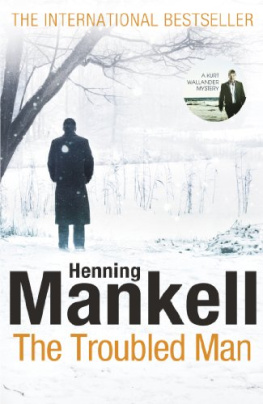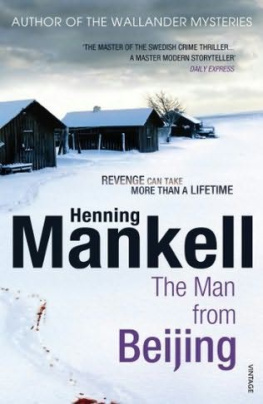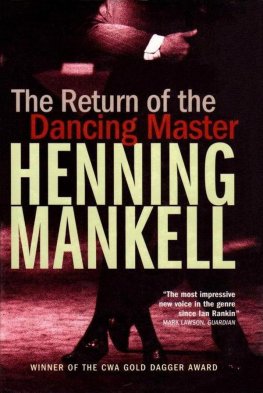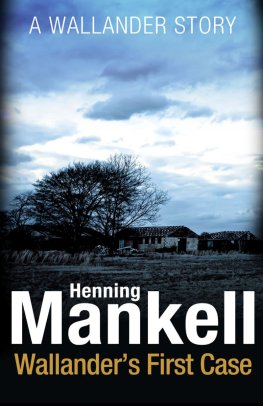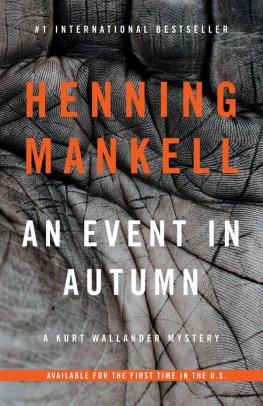Henning Mankell - One Step Behind
Here you can read online Henning Mankell - One Step Behind full text of the book (entire story) in english for free. Download pdf and epub, get meaning, cover and reviews about this ebook. genre: Detective and thriller. Description of the work, (preface) as well as reviews are available. Best literature library LitArk.com created for fans of good reading and offers a wide selection of genres:
Romance novel
Science fiction
Adventure
Detective
Science
History
Home and family
Prose
Art
Politics
Computer
Non-fiction
Religion
Business
Children
Humor
Choose a favorite category and find really read worthwhile books. Enjoy immersion in the world of imagination, feel the emotions of the characters or learn something new for yourself, make an fascinating discovery.

- Book:One Step Behind
- Author:
- Genre:
- Rating:5 / 5
- Favourites:Add to favourites
- Your mark:
- 100
- 1
- 2
- 3
- 4
- 5
One Step Behind: summary, description and annotation
We offer to read an annotation, description, summary or preface (depends on what the author of the book "One Step Behind" wrote himself). If you haven't found the necessary information about the book — write in the comments, we will try to find it.
One Step Behind — read online for free the complete book (whole text) full work
Below is the text of the book, divided by pages. System saving the place of the last page read, allows you to conveniently read the book "One Step Behind" online for free, without having to search again every time where you left off. Put a bookmark, and you can go to the page where you finished reading at any time.
Font size:
Interval:
Bookmark:

Henning Mankell
One Step Behind
The seventh book in the Kurt Wallander series, 1997
Translated From the Swedish by Ebba Segerberg
English translation The New Press, 2000
There are always many more disordered than
ordered systems
FROM THE SECOND LAW OF THERMODYNAMICS
The Overture to Rigoletto
GIUSEPPE VERDI
 *
* PROLOGUE
The rain stopped shortly after 5 p.m. The man crouching beside the thick tree trunk carefully removed his coat. The rain hadn't lasted for more than half an hour, and it hadn't been heavy, but damp had nonetheless seeped through his clothing. He felt a sudden flash of anger. He didn't want to catch a cold. Not now, not in the middle of summer.
He laid the raincoat on the ground and stood up. His legs were stiff. He started swaying back and forth gently to get his circulation going, at the same time looking around for any signs of movement. He knew that the people he was waiting for wouldn't arrive before 8 p.m. That was the plan. But there was a chance, however small, that someone else would come walking down one of the paths that snaked through the nature reserve. That was the only factor that lay beyond his control, the only thing he couldn't be sure of. Even so, he wasn't worried. It was Midsummer's Eve. There weren't any camping or picnic areas in the reserve, and the people had chosen the spot with care. They wanted to be alone.
They had decided on this place two weeks ago. At that point he had been following them closely for several months. He had even come to look at the spot after he learned of their decision. He had taken great pains not to let himself be seen as he wandered through the reserve. At one point an elderly couple came walking along one of the paths and he had hidden himself behind some trees until they passed.
Later, when he found the spot for their Midsummer festivities, he had immediately been struck by how ideal it was. It lay in a hollow with thick undergrowth all around. There were a few trees further up the hill. They couldn't have chosen a better spot not for their purposes, nor his own.
The rain clouds were dispersing. The sun came out and it immediately became warmer. It had been a chilly June. Everyone had complained about the early summer in Skne, and he had agreed. He always did. It's the only way to sidestep life's obstacles, he thought, to escape whatever crosses one's path. He had learned the art of agreeing.
He looked up at the sky. There would be no more rain. The spring and early summer had really been quite cold. But now, as evening approached on Midsummer's Eve, the sun came out at last. It will be a beautiful evening, he thought. As well as memorable.
The air smelt of wet grass. He heard the sound of flapping wings somewhere. To the left below the hill was a glimpse of the sea. He stood with his legs apart and spat out the wad of chewing tobacco that had started to dissolve in his mouth, then stamped it into the sand. He never left a single trace. He often thought that he should stop using tobacco. It was a bad habit, something that didn't suit him.
They had decided to meet in Hammar. That was the best place, since two of them were coming from Simrishamn and the others from Ystad. They would drive out to the nature reserve, park their cars, and walk to the spot they had chosen. They had not been able to agree upon anything for a long time. They had discussed various alternatives and sent the proposals back and forth. But when one of them finally suggested this place, the others had quickly assented, perhaps because they had run out of time. One of them took care of the food, while another went to Copenhagen and rented the clothes and wigs that were needed. Nothing would be left to chance. They even took the possibility of bad weather into account. At 2 p.m. on Midsummer's Eve, one of them put a big tarpaulin in his red duffel bag. He also included a roll of tape and some old aluminium tent pegs. If it rained, they would have shelter.
Everything was ready. There was only one thing that could not have been anticipated. One of them suddenly became ill. It was a young woman, the one who had perhaps been looking forward to the Midsummer's Eve plans most of all. She had met the others less than a year before. When she woke up that morning she had felt nauseated. At first she thought it was because she was nervous. But some hours later, when it was already midday, she had started vomiting and running a temperature. She still hoped it would pass. But when her lift arrived, she stood at the door on trembling legs and said that she was too ill to go.
Consequently, there were only three of them in Hammar shortly before 7.30 p.m on Midsummer's Eve. But they did not allow this to spoil the mood. They were experienced; they knew that these things happened. One could never guard against sudden illness.
They parked outside the nature reserve, took their baskets, and disappeared down one of the paths. One of them thought he heard an accordion in the distance. But otherwise there were just birds and the distant sound of the sea.
When they arrived at the selected spot they knew at once that it had been the right choice. Here they would be undisturbed and free to await the dawn.
The sky was now completely free of clouds. The midsummer night would be clear and beautiful. They had made the plans for Midsummer's Eve at the beginning of February, when they had spoken of their longing for light summer nights. They had drunk large quantities of wine and quarrelled at length about the precise meaning of the word dusk. At what point did this particular moment between light and dark arrive? How could one really describe the landscape of twilight in words? How much could you actually still see when the light passed into this obscure state of transition, defined by a certain length of the shadows? They had not come to an agreement. The question of dusk had remained unsolved. But they had started planning their celebration that evening.
They arrived at the hollow and put down their baskets, then separated and changed behind some thick bushes. They wedged small make-up mirrors in the branches so they could check that their wigs were on straight.
None of them sensed the man who observed their careful preparations from a distance. Getting the wigs to sit straight turned out to be the easiest part. Putting on the corsets, padding and petticoats was more difficult, as was arranging the cravat and the ruffles, not to mention applying the thick layers of powder. They wanted every detail to be perfect. They were playing a game, but the game was in earnest.
At 8 p.m. they came out from behind their bushes and looked at each other. It was a breathtaking moment. Once more they had left their own time for another age. The age of Bellman, the bacchanalian 18th-century poet.
They drew closer and burst into laughter. But then they regained their composure. They spread out a large tablecloth, unpacked their baskets and put on a tape with several renditions of the most famous songs from Bellman's work, Fredman's Epistles. Then the celebration began.
When winter comes, they said to each other, we will think back on this evening. They were creating yet another secret for themselves.
At midnight he had still not made up his mind. He knew he had plenty of time. They would be staying until dawn. Perhaps they would even stay and sleep all morning. He knew their plans down to the last detail. It gave him a feeling of unlimited power. Only he who had the upper hand would escape.
Next pageFont size:
Interval:
Bookmark:
Similar books «One Step Behind»
Look at similar books to One Step Behind. We have selected literature similar in name and meaning in the hope of providing readers with more options to find new, interesting, not yet read works.
Discussion, reviews of the book One Step Behind and just readers' own opinions. Leave your comments, write what you think about the work, its meaning or the main characters. Specify what exactly you liked and what you didn't like, and why you think so.


